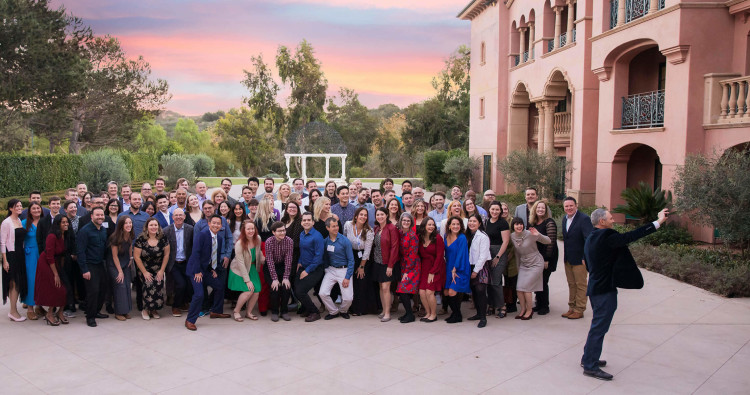
Bootstrapping is the best way to grow a meaningful and sustainable software company. | Photo by Jodi B Photography
Do what VCs say you should not
Will 2024 be a hot year for startups? Someone asked me this at the live event I did a few weeks ago. Many folks view hotness in relation to venture funding. With that outlook … well, the sun is not exactly shining on startup land. 2023 was not the brightest — year over year, funding dropped by over 35%. Cooling, if not flat-out chilly. But that does not mean we will see fewer impactful software companies emerge in 2024. There are always big problems to solve and people willing to take on difficult challenges.
Venture capital is so intertwined with new software companies that we forget how many of the best-known and most successful businesses started out bootstrapped.
In my experience, bootstrapping is the best way to grow a meaningful and sustainable software company. I have written countless blog posts inspired by our journey bootstrapping Aha! to a $100M+ business. We even launched a dedicated website to share our operating philosophy.
I started a personal newsletter last year called The Startup Adventure to share more of my perspective. In engaging directly with folks who are working at emerging companies, leading startups, or aspiring to entrepreneurship, I am still surprised by the stubbornness of the VC narrative.
The “if you raise, success will come” mentality persists — even as companies like our own disprove it.
Part of the pitch to founders is the guidance that outside investors can provide. I know this because for the last 10 years, I have received about 1,200 emails asking to “meet for coffee and listen to how our exceptional VC firm can help Aha! in its next phase of growth.” The thing is, Aha! achieved its growth by doing exactly what VCs say you should not do. So why would we change course now?
Besides, I would rather spend my free hour being outside or with my family. And I do not even drink coffee. If you are considering what route to take for your own company, I think you would be wise to consider the same approach and do what VCs say you should not:
Focus on a tiny market
VCs say: “Aim for a broad serviceable market. We want to see a large opportunity with people who are spending a lot of money.”
VC firms are making bets on many companies simultaneously. They need (at least) one to generate a major return. This means getting six times the return on their investment in a relatively short period of time, which means a big market.
You need a viable business. Entrepreneurs have to pay themselves and the team, which means you can take a longer outlook. Starting narrow is good. Focus on a tiny market and serve it well. Then, you have something — which can lead to something broader as you grow.
Be profitable
VCs say: “Always be raising money and seek more than you need. Make sure you are thinking about follow-on capital. Valuation is your focus.”
Nope. Your focus must be paying customers. This is how you validate your idea: Getting real people to pay for it — not by courting people who are betting on yours as one of many other businesses that might deliver a big return to their investors.
Your time is precious. Deliver a critical feature, meet with a new customer, or work on a slide deck you will present to a bunch of bankers? Choose what leads to profit.
Deprioritize networking
VCs say: “Network with our people. Let us introduce you to our expert entrepreneur-in-residence or other companies in our portfolio.”
Networking is a tool to solve a problem. But it is often a waste of time. That is because most people just do it to do it. Networking is social for some, and that makes it fun. But in the early days of a startup, you do not have time to take meetings with other founders. And even less so in the later days if you are fortunate enough to grow quickly.
A good co-founder is essential to working through issues. You can add in a few people whose opinions you really trust and be open to hearing their points of view. But trust your vision (that was validated by paying customers).
Do not sell
VCs say: “You need to build up a sales team to get customers.”
This one might be controversial to some. But I believe commissioned sales is not the best way to grow a software company. The short version is that it drives the wrong motivations and behaviors. (The original version from 2015 is here, with another from 2018 here.)
Reorient your thinking from how you can sell to how you can help customers buy. Because people who have problems want a solution. Spend time creating a product that is needed and loved. Spend time supporting the people who need that product by making it easy to try, use, and buy. And help them scale their use when they are convinced of the value.
Hire with caution
VCs say: “We can help you build a team quickly. You need to show growth, and hiring is essential for ‘scale.’”
Scale is among the most overused and misunderstood words in business.
Scale is how capable a company is of managing growing demand and increasing the value it delivers in a cost-effective way. Scale is not hiring people as fast as you can.
When I polled folks on LinkedIn about what they thought founders should not spend time on, hiring lots of people won out by far. Many left comments with their own experiences in emerging companies that staffed up fast. The detriment far outweighed any temporary boon.
Avoid spending
VCs say: “Show the market you are a big player. It might be time to make a significant splash to put yourself on the map.”
You need some money to start a business. And you need money to keep a business going. Frugality is underrated among fast-growing software companies. Be prudent and thoughtful with your spending. Wasting resources is an affront to the legacy of what you are working towards. Build up your own financial reserves for when or if you need them — that security is a strength.
Be open to a small exit
VCs say: “Aim for a big exit.”
VCs are the ones who need really big exits. But a small exit is life-altering for many folks on an entrepreneurial journey. You can take the learnings, new skills, and validation that you can be successful (and a few million to tens of millions of dollars) to your next venture. It builds your confidence and can create room for more opportunities. Assuming, of course, that it is the right choice for you.
You have to be honest with yourself about what is ahead of you. If you think it is best for customers, colleagues, and yourself, a small exit can certainly be transformative.
Breakthroughs are rare and require daring. Can you name a founder who got there by following conventional advice?
The ones who succeed are the ones who take a risk on a new vision for the future. I say give your soul to what you are building and not to a banker. Your power comes from what makes you unique — your authenticity and heart. Do what they say you should not.
Your journey to building a lovable company starts here. Sign up for The Startup Adventure newsletter.




